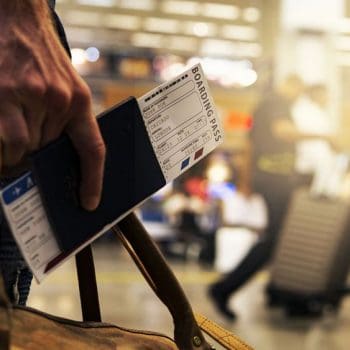 Cancelled flights and complicated travel protocols have become all too common amidst the chaos of the COVID-19 pandemic, whose outbreak all but grounded the global airline industry. However, we still know little about how these new job stressors actually affect airline workers. Shedding light on this important issue, Professor Sam Kim of the School of Hotel and Tourism Management (SHTM) at The Hong Kong Polytechnic University and co-researchers identified the major pandemic-related stressors that have emerged for airline workers and explored their effects on workers’ mental health and job-related outcomes such as satisfaction, motivation and performance. The authors’ findings offer invaluable practical guidance for alleviating the worrying knock-on effects of the pandemic on the well-being of airline employees and the growth of the airline industry as a whole.
Cancelled flights and complicated travel protocols have become all too common amidst the chaos of the COVID-19 pandemic, whose outbreak all but grounded the global airline industry. However, we still know little about how these new job stressors actually affect airline workers. Shedding light on this important issue, Professor Sam Kim of the School of Hotel and Tourism Management (SHTM) at The Hong Kong Polytechnic University and co-researchers identified the major pandemic-related stressors that have emerged for airline workers and explored their effects on workers’ mental health and job-related outcomes such as satisfaction, motivation and performance. The authors’ findings offer invaluable practical guidance for alleviating the worrying knock-on effects of the pandemic on the well-being of airline employees and the growth of the airline industry as a whole.
Irregular schedules, night shifts, physical exertion and time zone changes are part of life for airline workers. Since the outbreak of COVID-19, however, employees have faced a horde of fresh difficulties. With planes grounded across the world, mass redundancies and restructuring have profoundly increased job insecurity. Safety-related stressors such as sanitisation and mask wearing requirements, along with strict and time-consuming immigration procedures, hotel quarantine and fear of contracting the virus, are now also part of employees’ new routine. “The new types of stressors resulting from the pandemic, as well as traditional stressors, will have many job-related consequences”, warn the researchers.
More exposure to stressors means more job-related stress. Studies have found that such stress explains the high prevalence of physical and mental health problems in flight attendants and triggers emotional exhaustion, burnout, depersonalisation and depression in hotel employees. Protecting employees’ mental health – which has been damaged by the COVID-19 pandemic – is not only a major public health issue but also critical to business success. Yet “studies that scrutinise the antecedents of mental health problems and their consequences in the hospitality and tourism industry are still limited”, say the authors. Recognising this, they set out to pinpoint what the major new stressors are for airline workers and how and to what extent they impact mental health and job outcomes.
The effects of mental health on job outcomes – such as job satisfaction and job performance – in the hospitality and tourism industry are understudied. Perhaps unsurprisingly, research in other contexts has shown that an unhealthy working environment and work stress decrease job satisfaction. Poor mental health may also worsen job performance. This may in turn generate significant costs for employers, state the researchers, “such as increases in work-related injuries, reduced productivity, absenteeism, presenteeism, and employee compensation claims”. Mental health could also influence employees’ perception of company image, which reflects workplace morale, pride and motivation. People with poor mental health also tend to have “a reduced responsiveness to others’ needs”, which creates obvious problems in the service sector.
The researchers also examined the possibility that job satisfaction in turn influences job performance, company images and prosocial behaviour. Job satisfaction has been found to enhance job performance in flight attendants, and to predict more positive perceptions of company image in airline employees. More generally, job satisfaction is thought to increase an individual’s willingness to contribute to the community in the form of pro-social behaviours. But how has job satisfaction affected these work outcomes in airline workers during the COVID-19 pandemic?
Also of interest was whether sociodemographic and job-related characteristics alter the relationships between job-related stress, mental health, and job outcomes. For example, during crises like the pandemic, “age may determine contract renewal, layoff, or fringe benefit provision”, say the researchers.
The questionnaire used in this study was developed in several careful stages, the first being indepth interviews with 15 airline employees to better glimpse working conditions before and during the crisis. Insights were used for subsequent creation of the questionnaire. Its 40 items assessed job stressors—including traditional and new stressors—job satisfaction, organisational commitment, perceived company image, job performance and pro-social behaviour. As a final preparatory step, the questionnaire was piloted with 100 Hong Kong airline employees to doublecheck its validity and reliability.
After tweaking, the questionnaire was distributed to 374 Hong Kong airline employees between 15 July and 30 December 2020. Over half of the participants were men (63%), and most were in their 20s or 30s. The vast majority worked for full-service carriers in Hong Kong. More than 75% worked in flight operation departments and 20.9% worked in ground operation departments. Almost half had worked in the airline industry for 10 years or more. With regard to their positions in the airline industry, 46% were at supervisory level, followed by entry-level (43.8%) and managerial level or above (10.2%). The questionnaire responses were analysed to examine the structural relationships between the variables.
Passenger arrivals at Hong Kong International airport decreased by 98.5% between October 2019 and October 2020. This simple fact could account for the study’s first finding – that traditional job-related stressors did not affect airline employees’ mental health after the COVID-19 outbreak. “When airline employees can perform few of their normal duties, physical exhaustion, schedule conflicts and demanding workloads cannot affect mental health status”, explain the authors. Nevertheless, the pandemic brought with it three significant new stressors: hygiene requirements, safety concerns, and job instability. Of these, safety concerns and job instability significantly impacted mental health.
The researchers found that more intense safety concerns were detrimental to mental health. As the researchers note, airline employees’ mental health “is important to enable them to consistently provide high quality service to passengers”. Therefore, overcoming safety concerns could be a decisive strategy. Airlines could follow the example set by Emirates Airline, which has distributed “hygiene kits”, organised individual hotel rooms in outport destinations, and enforced a 14-day quarantine for its employees. More transparency about confirmed cases on specific flights and providing information about safety measures in risky destinations could also reduce concerns.
Quite unexpectedly, job instability was associated with better mental health. On the face of it, this is mystifying, at odds with pre-pandemic reports that job uncertainty worsens mental health. “Airline crew seemed to feel grateful to retain their jobs in an economic crisis”, infer the authors. Cost-saving measures implemented by an airline could also signal its efforts to ride out hardship “together with its employees”, thus generating positive mental health effects.
This important study shed light not only on the factors shaping mental health but also on its consequences: good mental health was found to enhance job satisfaction, job performance, perceived company image, and prosocial behaviours. Job satisfaction also improved job performance, perceived company image and prosocial behaviours. These findings underscore the potentially far-reaching benefits of fostering a healthy working environment and promoting employee satisfaction.
Airlines wishing to support their employees’ mental health should also note that perceived stressors and their effects differ according to age, sex, job position, and working experience. “Mental health programmes are required to be differently applied according to employees’ career or demographic characteristics”, conclude the authors.
Shedding new light on mental health in airline workers, this work suggests that airlines should eradicate safety concerns as much as possible. Surprisingly, job instability was found to improve workers’ mental health. However, airlines and governments should by no means use this finding as an excuse to overlook the issue, not least because job instability and unemployment are serious problems in Hong Kong. “Cabin crew who have worked for their airline for a long time should be helped to upgrade their skills and know-how to dissipate job stressors during the present unstable business environment in the airline industry”, conclude the researchers.
About the authors
Kim, Seongseop (Sam), Wong, Antony King Fung, Han, Heesup, and Yeung, Man Wah (Vanessa) (2022). How Does the COVID-19 Pandemic Influence Travel Industry Employees in Hong Kong? Structural Relationships Among Airline Crew’s Job-Related Stressors, Mental Health and Other Consequences. Asia Pacific Journal of Tourism Research, Vol. 27, Issue 1, pp. 69-85.
The Hong Kong Polytechnic University, School of Hotel and Tourism Management.

















